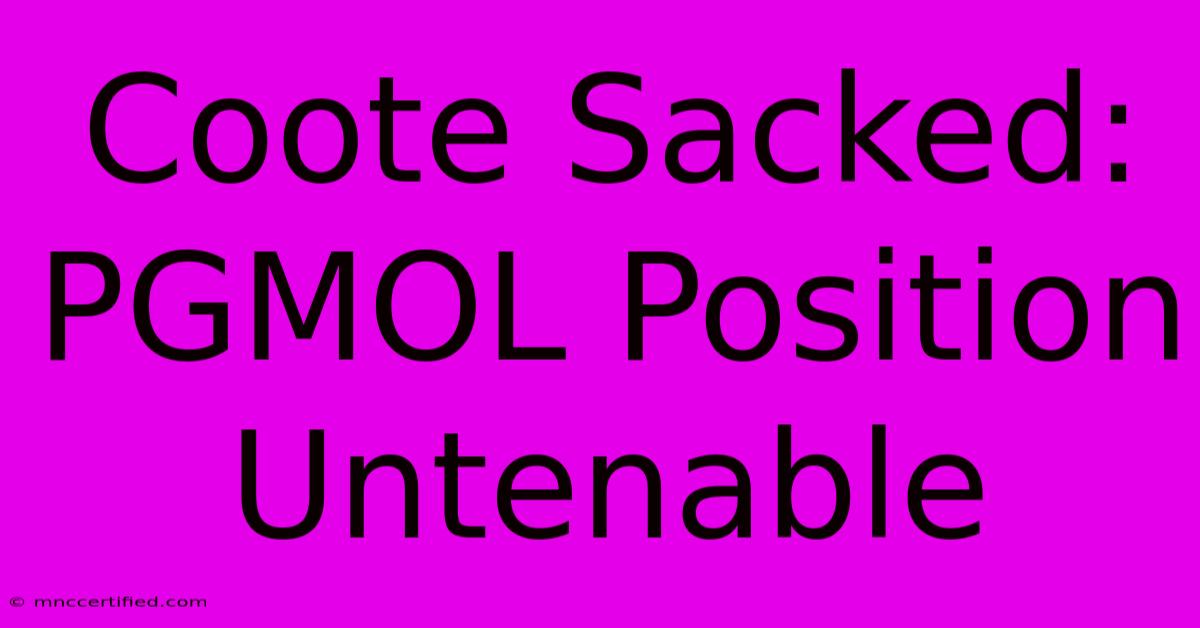Coote Sacked: PGMOL Position Untenable

Table of Contents
Coote Sacked: PGMOL Position Untenable? The Fallout from a Refereeing Fiasco
The sacking of Lee Mason, a highly-respected Premier League assistant referee, following his crucial error in the Arsenal vs. Brentford game, has sent shockwaves through the footballing world. This isn't just about one missed offside; it highlights a deeper issue with the Professional Game Match Officials Limited (PGMOL) and the increasing pressure on match officials. The question on everyone's lips: is the PGMOL's position now untenable?
The Brentford Blunder: A Catalyst for Change?
The incident itself is well-documented. Ivan Toney's goal, initially disallowed for offside, was later shown to be incorrectly flagged. Mason, positioned on the far side, missed a clear offside offence. This error directly impacted the outcome of the game, fueling already simmering discontent amongst Arsenal fans and raising serious questions about the accuracy and consistency of officiating in the Premier League. The subsequent apology from PGMOL, while acknowledging the mistake, felt insufficient for many.
More Than Just One Mistake: A Systemic Problem?
While Mason's error was egregious, it's crucial to view it within a wider context. This wasn't an isolated incident. Recent Premier League seasons have seen a spate of controversial refereeing decisions, leading to accusations of bias and inconsistency. The pressure on referees is immense, with every call scrutinized by millions and amplified by social media. This intense scrutiny, coupled with the inherent complexities of the game, creates a challenging environment for match officials.
Is the current system equipping referees adequately? This is a vital question that needs addressing. The PGMOL's training methods, technological support, and overall management structure are all subject to intense debate. Mason's sacking, while seemingly a decisive action, doesn't address the underlying systemic issues within PGMOL.
The PGMOL's Response: Damage Control or Genuine Reform?
The immediate aftermath saw a flurry of activity from the PGMOL. Alongside Mason's dismissal, there were discussions regarding improved technology and additional training. However, many feel these measures are reactive rather than proactive, addressing symptoms rather than the disease. Genuine reform requires a holistic approach. This necessitates:
- Enhanced Technology Integration: More widespread use of VAR and improved communication between on-field officials and VAR teams.
- Improved Training and Support: A more rigorous and consistent training program, focusing on decision-making under pressure and managing the psychological impact of high-stakes matches.
- Increased Transparency and Accountability: A clearer process for reviewing decisions and holding officials accountable, fostering trust and confidence amongst fans.
- Addressing Systemic Pressures: Recognizing and mitigating the immense pressure on referees, providing better mental health support and protection from online abuse.
The Future of Refereeing: A Crossroads
The events surrounding Lee Mason's sacking represent a pivotal moment for the Premier League and the PGMOL. While dismissing Mason might offer a sense of immediate appeasement, it won't resolve the underlying concerns. The PGMOL's future hangs in the balance. Failure to implement meaningful and lasting reform will only lead to further controversies and erode public confidence in the integrity of the game. The focus now must shift from crisis management to genuine reform, ensuring a fairer and more transparent system for all.
Keywords: Coote Sacked, PGMOL, Lee Mason, Refereeing Errors, Premier League, VAR, Arsenal, Brentford, Offside, Football, Systemic Issues, Accountability, Transparency, Referee Training, Technological Improvements, Game Integrity.

Thank you for visiting our website wich cover about Coote Sacked: PGMOL Position Untenable. We hope the information provided has been useful to you. Feel free to contact us if you have any questions or need further assistance. See you next time and dont miss to bookmark.
Featured Posts
-
Cavills Warhammer 40k Games Workshop Amazon Deal
Dec 10, 2024
-
Strong Person Award Luigi Mangione Penn 20
Dec 10, 2024
-
Matchday 6 Ucl Possible Starting Xis
Dec 10, 2024
-
Morris County Mayors Address Drone Issue
Dec 10, 2024
-
Soad North American Tour Presale Info
Dec 10, 2024